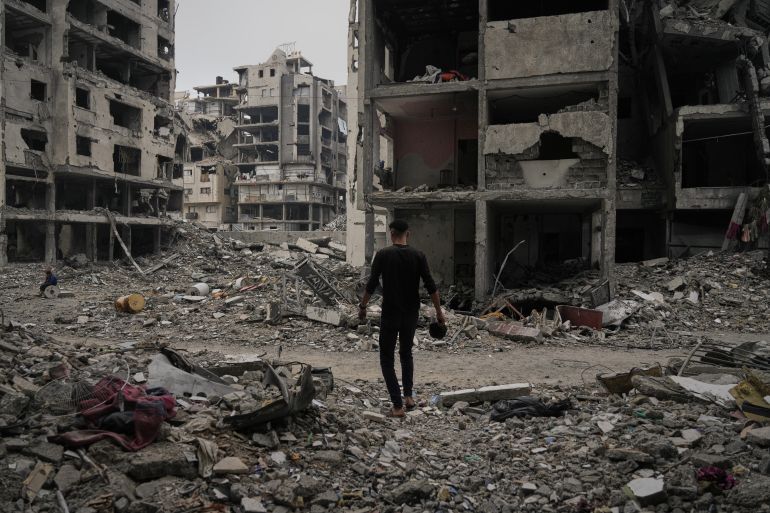Despite the ceasefire, Israeli forces continued to fire on neighborhoods across Gaza, killing at least four Palestinians, and injuring several more, according to hospital officials who spoke to Al Jazeera.
A Palestinian man was killed on Monday in Bani Suheila, east of Khan Younis, in an area that extends beyond the so-called “yellow line,” the Israeli military-imposed boundary that Israel uses to mark areas under its military control.
Recommended Stories
list of 3 itemsend of list
Israeli attacks continued throughout the day, according to Al Jazeera’s ground-based teams, with reports of air raids, artillery, and helicopter strikes in both northern and southern Gaza.
Israeli fire raged near the yellow line in Beit Lahiya. Northeast of Rafah and the Khan Younis borderline were targeted by tanks and helicopters in the south.
According to Al Jazeera’s Tareq Abu Azzoum, a journalist from Gaza City, “extensive Israeli attacks beyond the yellow line have caused Gaza’s eastern neighbourhoods to be systematically destroyed.”
He continued, “A systematic attempt to destroy Gaza’s neighbourhoods and create buffer zones, making these areas completely uninhabitable, which complicates a return for families.”
According to the Palestinian Wafa news agency, civil defense teams working with police and the Red Cross recovered the bodies of eight members of a single family from the rubble of their camp in central Gaza, which was damaged by an earlier Israeli attack.
More than 9,500 Palestinians are still missing beneath the ruins of bombed-out districts, according to the Gaza Government Media Office, who reported that the number of bodies recovered since the ceasefire had now reached 582.
Meanwhile, Hamas’s armed wing announced that the Israeli prisoner’s body had been recovered from the Nuseirat camp in central Gaza.
In the first phase of the ceasefire agreement, two captives’ bodies must still be recovered. Hassan said efforts to locate the remaining bodies have been hampered by the widespread destruction.
The GHF, a US-backed organization that operated in parallel with UN aid organizations, announced on Monday that its activities in Gaza were over.
The organization cited provisions from the ceasefire from October as the cause of its withdrawal.
Since May 2025, according to UN experts, at least 859 Palestinians have died in the vicinity of GHF distribution points, with Israeli forces and foreign contractors frequently opening fire on crowds desperate for food.
The scheme’s failure to use established humanitarian channels was widely condemned.
Israeli attacks on the West Bank
Israeli forces increased their raids overnight across the occupied West Bank, arresting at least 16 Palestinians, according to Wafa. In Iktaba near Tulkarem, in Tuqu southeast of Bethlehem, in Kobar near Ramallah, and in Silat al-Harithiya west of Jenin, arrests were reported.
Residents of Tubas and the surrounding areas were also taken into custody by Israeli troops.
Baraa Khairi Ali Maali, a 20-year-old law student, was killed by Israeli forces in Deir Jarir, north of Ramallah, on Sunday night, in a violent incident.
According to Wafa, Israeli settlers attacked Palestinian homes on the village’s outskirts, sparking altercations. The village’s head of the community, Fathi Hamdan, claimed soldiers stormed the area to appease the settlers before firing on Palestinians who were confronting them.
![Mourners pray next to the body of one of two Palestinians killed by Israeli fire in Khan Younis in the southern Gaza Strip, November 24, 2025. [Ramadan Abed/Reuters]](https://i0.wp.com/www.aljazeera.com/wp-content/uploads/2025/11/2025-11-24T102903Z_1570249249_RC2Y2IASY4MS_RTRMADP_3_ISRAEL-PALESTINIANS-GAZA-1763993548.jpg?w=696&ssl=1)
Maali passed away shortly after arriving at the hospital from a gunshot wound to the chest. His murder comes after settlers fatally shot another young man in Deir Jarir earlier this month.
In another West Bank raid, Israeli soldiers injured two Palestinian women and detained two brothers in Kafr Qaddum, east of Qalqilya.
Settler attacks continued, too. Between Atara and Birzeit, north of Ramallah, fires erupted on agricultural land, destroying farmland owned by residents.
In a separate incident, locals from a newly established outpost threw out farming equipment and torched olive trees in Atara.
Since October 7, 2023, at least 1, 081 Palestinians have been killed in the occupied West Bank by Israeli forces and settlers, including 223 children, in addition to more than 10, 614 were hurt, and more than 20, 500 have been detained. In addition, more than 10, 614 have been injured, and more than 20, 500 have been detained.
Israeli violations of the Lebanon ceasefire
Hezbollah held a funeral for senior commander Haytham Ali Tabatabai, who was killed by Israel on Sunday in Lebanon.
Hezbollah flags lined the streets as mourners carried his coffin, wrapped in yellow and green, from Beirut’s southern suburbs. The organization has not yet made its response known.
The killing was described as “yet another ceasefire violation” by Mahmoud Qmati, the vice president of Hezbollah’s political council, while denying that Israel had “given the green light” to escalate the conflict.
Hezbollah is weighing its options carefully, according to security analyst Ali Rizk, who noted that it is unlikely to “give Netanyahu an excuse to launch an all-out war against Lebanon,” which he claimed could be more devastating than the current limited exchanges.
![Hezbollah fighters raise their group's flags and chant slogans as they attend the funeral procession of Hezbollah's chief of staff, Haytham Tabtabai, and two other Hezbollah members who were killed in Sunday's Israeli airstrike, in a southern suburb of Beirut, Lebanon, Monday, November 24, 2025. [Hussein Malla/AP]](https://i0.wp.com/www.aljazeera.com/wp-content/uploads/2025/11/AP25328410378279-1763992752.jpg?w=696&ssl=1)
According to geopolitical analyst Joe Macaron, the US is no longer “restraining Israel” but is supporting Israeli operations in Syria, Gaza, and Lebanon.
Hezbollah is confronted by Al Jazeera’s Zeina Khodr, who reported from Beirut. Retaliation could face a significant Israeli assault, but inaction could erode its deterrence, according to Zeina Khodr, who reports from Beirut.
Any Hezbollah response, according to Imad Salamey of the Lebanese American University, could result in “severe” Israeli responses.
He added that the right-wing Israeli government is “eager to escalate because escalation will serve that government staying in power.”
Source: Aljazeera

Leave a Reply